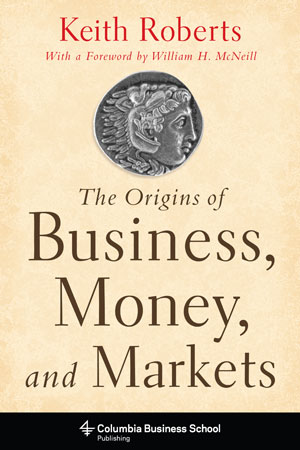
This is the first book to trace the genesis of modern business in Western antiquity. The time span stretches from prehistoric times to the late 7th century AD.
The Origins of Business, Money, and Markets focuses on the key civilizations and periods in this story. It is a chronological tour of the major ancient Western civilizations, a survey of much of antiquity’s social, economic, and political history through the lens of business.
The book proceeds in three Parts: the ancient Middle East, the Hellenic world, and Rome.
The circumstances and mentality of prehistoric societies did not include any concept or possibility of selling at a profit. Only with the first civilizations in Egypt and Mesopotamia about 5000 years ago did any such notion appear. As the early states expanded and developed bureaucratic competence, the mentality and skills essential to business operations began to emerge. And, especially in Mesopotamia, so did governmental accomplishments that expanded trade and other business activities. Business remained a marginal activity, however, because the Middle Eastern states used status, rather than purchasing power, as the basis for distributing economic benefits.
In Athens and other Greek city-states after 600 BC, a complex combination of entrepreneurship, coins, and markets gave birth to business recognizable in its modern form. An entrepreneurial market system became central to Greek urban economies, while banking and other forms of business provided an avenue of social advancement. In the 4th century BC, Alexander the Great and the Macedonian rulers who followed him spread this economic system to hundreds of cities throughout the Mediterranean region. In the Hellenistic world that they created, however, the profitability and social status of business sharply declined.
Business reached its most prominent ancient position during a four hundred year period between 200 BC and 200 AD. The Romans favored entrepreneurial market systems in cities throughout the parts of Africa and western Europe, which they conquered. Romans invented multinational business corporations, which attained considerable size and influence.
Meanwhile, in the distant sub-province of Judea, a series of political and religious developments would strongly influence the nature of business for many centuries thereafter: Hillel and Jesus with their humanistic teachings, the Christian Church, and the completion of the Jewish diaspora throughout the Eurasian landmass.
An important part of the Roman story is the explanation of how concentrated wealth played a major role in killing off business in most of Western Europe after 200 AD. From the Eastern half of the Roman Empire, though, the nexus between money, markets, and business would pass intact to succeeding states, most notably the Byzantine Empire and the Islamic caliphates.
In a very brief concluding chapter, I offer thoughts about modern business that arose as I researched and wrote the book. They cover three areas: wealth, morality, and public policy.
“An important part of the Roman story is the explanation of how concentrated wealth played a major role in killing off business in most of Western Europe after 200 AD.”
Each chapter deals with similar questions. What were the main forces that shaped business and its role in the economy? What new businesses emerged? How did they operate? What was the nature of business labor? How were business people regarded? In short: What was new about business, and why?
My concept of the key forces that shaped business includes both impersonal forces like climate, geography, and technology, and the contributions of extraordinary individuals. Given the times, they were almost all men: kings called “the great,” such as Sargon, Cyrus, and Darius in the Middle East, and of course Alexander of Macedon; thinkers like Solon, Aristotle, and Archimedes; Roman emperors including Augustus, Diocletian and Constantine. We also encounter such businessmen as the trader Imdi-Ilum of 2000 BC Assur, the banker Balmonahse of Babylonia, Roman investors like Pliny the Younger and Cato the Elder, and the greatest ancient tycoon of all, Marcus Crassus. All these people inhabited a world full of murder, cruelty, villainy and perversion, as well as love, wisdom, courage and heroism—and so, therefore, does the story.
You ask how my professional path led to this book. Others have asked how long it took me to write, and I usually answer “all my life.”
I was the lucky recipient of a wonderful liberal arts education, in the course of which my chief passion was the law. But shortly after graduating from law school I happened into one entrepreneurial role after another, ultimately managing or participating in a broad variety of small businesses: law firm management, investment advisory services, real estate development, magazine publishing, cosmetic and toilet goods marketing and distribution, and contract manufacturing. Along the way I was an avid business school student and reader of business journals, and took many independent courses in management.
It was while trying to modernize the management and operation of my manufacturing company that the idea leading to this book first emerged. Late one evening I was stomping around my office, talking to myself in frustration about poor management, when I heard myself say “This @#$#@ company is run like a Roman blacksmith shop!” And that stopped me. I realized that I had no idea how Roman blacksmiths operated—or even whether they existed in ancient Rome.
I got curious about how business first began, and tried to find a book on the subject. Finding none, I started reading business history. Pretty soon I realized that there was an important not to mention interesting story here. And nobody had ever told it.
I would suggest that your browser first reads the book jacket’s summary. That should give an idea of what the book is all about.
After that, it’s a toss up between the Introduction and the very brief Concluding Thoughts section.
If your browser is a business leader or a policy maven, I would suggest the Concluding Thoughts, which relate the most interesting lessons about modern concerns that I think the history suggests.
But if the browser is not especially knowledgeable about business, the Introduction is probably the best place to start.
“You ask how my professional path led to this book. Others have asked how long it took me to write, and I usually answer ‘all my life.’”
In describing the driving forces of an earlier, simpler time, this book provides a relatively simple and comprehensible model of business today.
Sure, there are important differences, but most of what business now does was also done in ancient times. And most of the management techniques and operational methods today are either similar to those of ancient times, or logical extensions of prior practices. As a result, the relatively simple historical model developed in this book offers a good understanding of what business does, what nurtures or harms it, and what dangers it holds for society at large.
The primary example I would offer, of how the ancient history provides an instructive model today, is the role of finance. Even though I have spent much of my life working in investment, accounting, venture capital, and other financial roles, I didn’t actually know much about it until researching and writing this book.
Because of what I learned, and what readers will learn from the book, I would summarize the role in business of finance in the following way:
(1) desire combined with purchasing power equals demand;
(2) by stimulating demand, business creates wealth;
(3) purchasing power is the key limitation on the amount of demand and wealth that business can stimulate;
(4) the main type of purchasing power is credit; and
(5) the main variable that determines the amount of credit available is trust in the borrower’s promise of repayment.
All this explains the importance to business of finance, and the importance to finance of trust.
I do not wish to overstate the case. There are obvious differences between ancient and modern business. In my opinion, the chief difference is very beneficial: the important role that modern business plays in creating wealth. Ancient business worked with wealth that came primarily from agricultural surpluses. Most of today’s wealth, by contrast, comes from the purposeful innovation and marketing efforts of business, which were largely unknown in ancient times. As a result, modern business creates most of today’s wealth.
This is largely a blessing, but it has also created a grave danger. Rome was nearly destroyed when its major businesses briefly took control of Rome’s foreign policy and pursued such short-sighted and selfish goals that Rome’s very existence became seriously jeopardized.
Modern business has gained a similarly outsized and self-interested voice in public policy. We can see it in Europe, where the banks, trying to get taxpayers and public employees to absorb all the losses that the banks foolishly incurred in 2007-10, are pushing people to the brink of revolt. The banks’ greed is threatening the destruction of the entire Euro system. And, of course, we can see it in the United States, where big business similarly pursues selfish goals at the cost of the social fabric that ultimately sustains it.


Keith Roberts earned his B.A. at Harvard University and is a graduate of Harvard Law School and the Harvard Business School’s Program in Venture Capital. He has served as president of The Preservation Group, a San Francisco real estate firm, Roberts Proprietaries, Inc., a manufacturing and distribution company, and other firms. He is an arbitrator for the Financial Industries Regulatory Authority and a mediator in the New York court system.